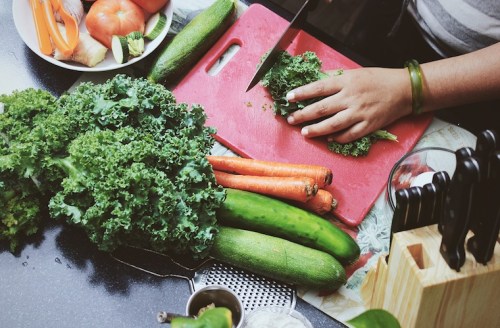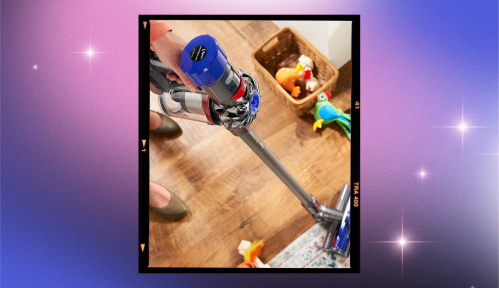Our editors independently select these products. Making a purchase through our links may earn Well+Good a commission
If it seems like your entire wellness orbit is suddenly swapping tips on the best grass-fed butters and beef jerky bars, you’ve likely got the ketogenic diet to thank. Everyone from celebrity doctors to your cross-fitting bestie seems to have tried—or have an opinion on—the high-fat, low-carb eating plan. But hopping on the bandwagon yourself can seem next to impossible when you’re vegan or vegetarian, since fish, meat, dairy, and eggs factor into the majority of keto-friendly recipes and snacks.
The truth is, going keto as a vegetarian does require planning, as it’s important to guarantee you’re getting all of your nutrients. But according Liz MacDowell, holistic nutrition consultant and the blogger behind Meat Free Keto, it doesn’t require much more planning than following a conventional plant-based diet.
Guided by her education in nutrition, MacDowell took the vegan keto plunge herself after years of suffering from IBS and related conditions. “The more I learned about health and nutrition, the more I was tweaking my diet and it was like a revelation to me,” she says.
Six years later, MacDowell has the vegan-keto lifestyle down. Here, she shares the key foods and supplements to include in a plant-based keto way of life. All of these will ensure you experience the up-leveled energy, mental clarity, and reduced inflammation the diet’s known for—pass the avocado fries.
Keep reading for MacDowell’s top tips for going keto as a vegetarian or vegan.

Start with an all-star multivitamin
If you’re a vegan or vegetarian (and keto, to boot), MacDowell and other nutrition experts agree that investing in a daily multivitamin is a must. That’s because there are certain nutrients—vitamin B12 and vitamin D, to name a few—that are hard to get enough of from plants alone.
In the spirit of her whole-foods-first philosophy, MacDowell recommends Garden of Life supplements if you don’t already have a go-to multi. “All of their supplements are pretty vegan-friendly and from high-quality sources. A lot of them are food-based, which I think is great,” she says.

Turn to hemp seeds and nutritional yeast for a protein boost
Even if you usually roll your eyes in response to the “How do you get enough protein?” question, it’s actually an important one in the context of the ketogenic diet. After all, you should be getting about 0.8 times your lean mass in protein each day while strictly limiting your carb intake—and that means cutting back on major plant-based protein sources like beans and grains.
MacDowell recommends supplementing your meals with both nutritional yeast and hemp seeds. According to MacDowell, nutritional yeast—a common vegan pantry staple—is loaded with B vitamins and about three grams of complete protein per tablespoon. While that may not sound like much at first, a few tablespoons sprinkled on all your savory dishes (like this cauliflower cacio e pepe, perhaps?) can quickly add up.
Hemp seeds are another nutritional multitasker. A quarter-cup serving has about 15 grams of protein and almost half your daily iron requirement. Plus, they’re loaded with omega-3 fatty acids, according to MacDowell. If those stats weren’t game-changing enough, the blogger’s favorite hemp seed hack definitely is. “I mix it into cauliflower rice, just to add some texture,” she says. “It gives it almost that chew you get from real rice.” Now that is a keto #win that anyone can get behind, meat eaters included.

Get your B vitamins from nuts and seeds
Next, MacDowell advises upping your intake of B vitamins, specifically B5, which aids in fatty acid synthesis, and B12, which is only found in animal products. “B vitamins are used by our bodies for energy, metabolism support, and creating new blood cells,” she explains.
Many non-dairy milks are formulated with B12, but MacDowell also suggests creating a rotation of whole almonds, pumpkin seeds, and sunflower seeds (which pull double-duty by being high in vitamin B5, too). She also calls out avocados as a reliable source of vitamin B5. “You can get up to 40% of your daily B5 intake from just one avocado,” she says. Is there anything this superfruit can’t do?

Fight inflammation with flax and chia seeds
While salmon may be the go-to keto source for omega-3-fatty acids, MacDowell promises that plant-derived options stack up just as well. “Flax and chia seeds have a favorable ratio of omega-3 fatty acids to omega-6-fatty acids.” According to MacDowell, omega-6-fatty acids are pro-inflammatory—and they’re abundant in nuts, seeds, and vegetable oils—so it’s super important to balance them out with omega-3’s. “Both flax and chia seeds are anti-inflammatory and easy to put in a smoothie as well,” MacDowell adds. (A keto-approved, fruit-free blend, of course.)

Load up on calcium-rich leafy greens
By now, you may know that supplements aren’t necessarily the best way to get your daily calcium fix. Instead, MacDowell recommends turning to leafy greens to get all of the nutrient’s bone-strengthening benefits.
“Leafy greens are a great source of calcium. In particular, look for collards and kale, as well as bok choi,” she says. To keep the variety going, MacDowell also recommends a mix of foods that are moderately high in calcium. “Arugula, broccoli, and almonds are other low-carb foods that are fairly rich in calcium. When you eat them in combination throughout the day, it’s easy to [reach] your daily value.” Just make sure your greens are slathered in healthy fats to make them truly keto—as if you needed another excuse to double down on the vegan ranch dressing, right?
BTW, these are the most common mistakes made by newcomers to the ketogenic diet. And here’s what you need to know about working out when you adopt the keto lifestyle.
Sign Up for Our Daily Newsletter
Get all the latest in wellness, trends, food, fitness, beauty, and more delivered right to your inbox.
Got it, you've been added to our email list.











